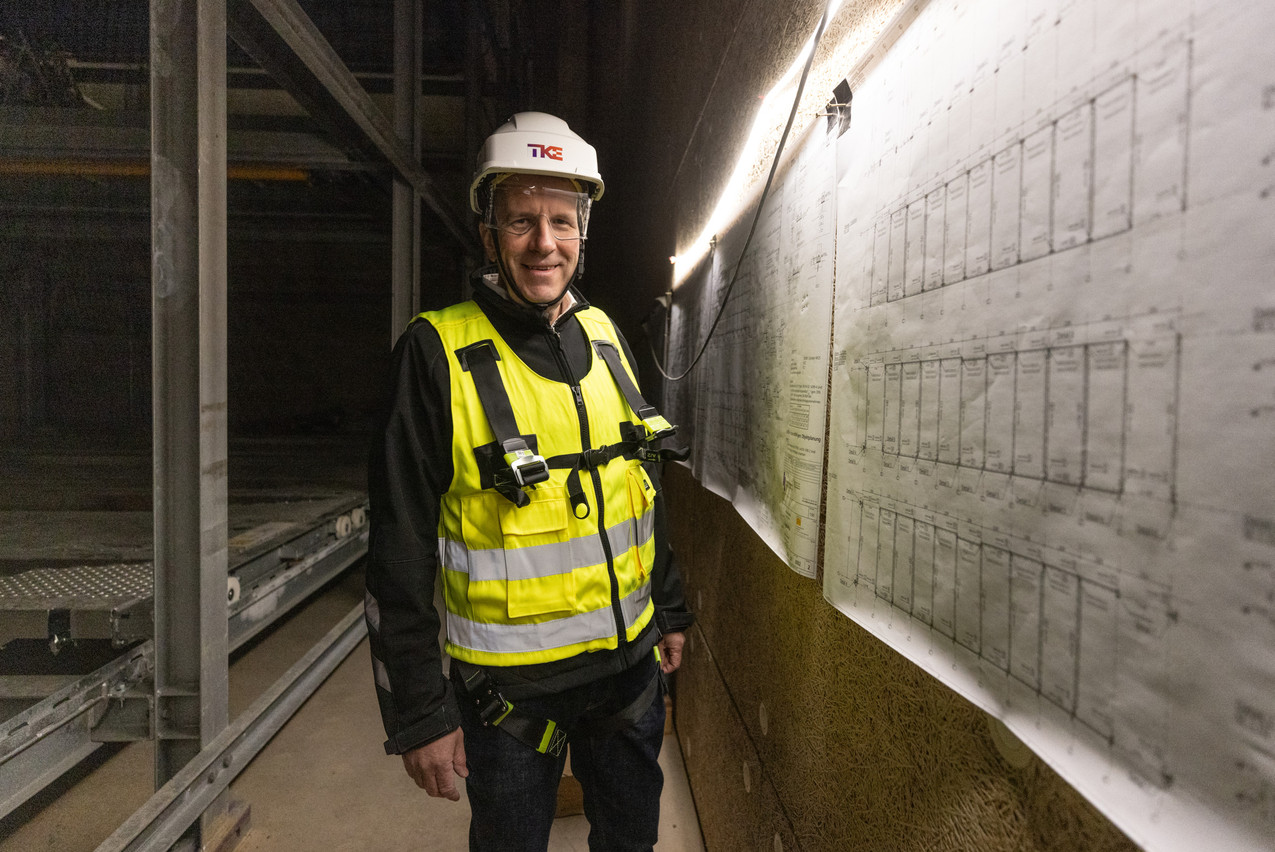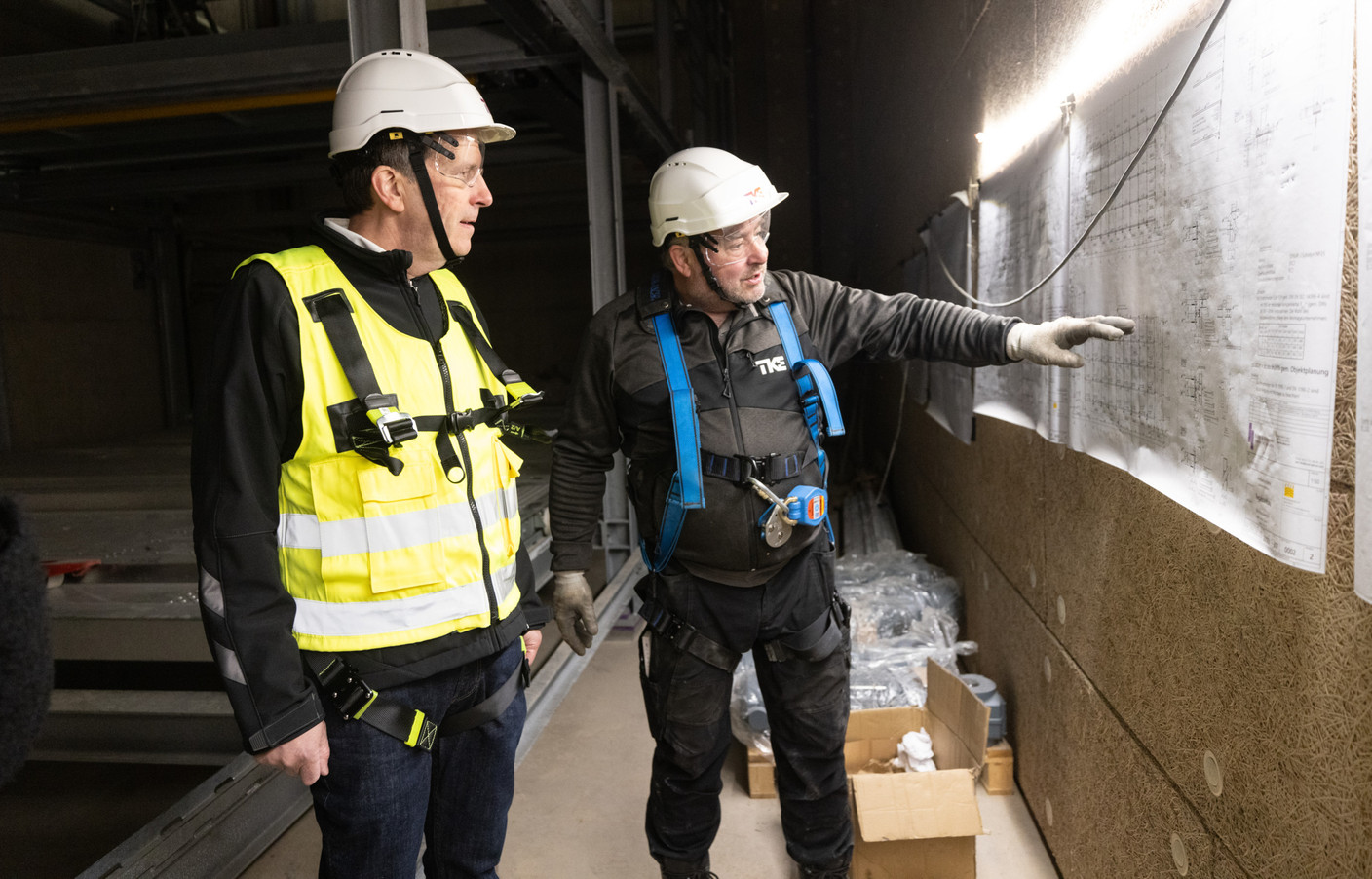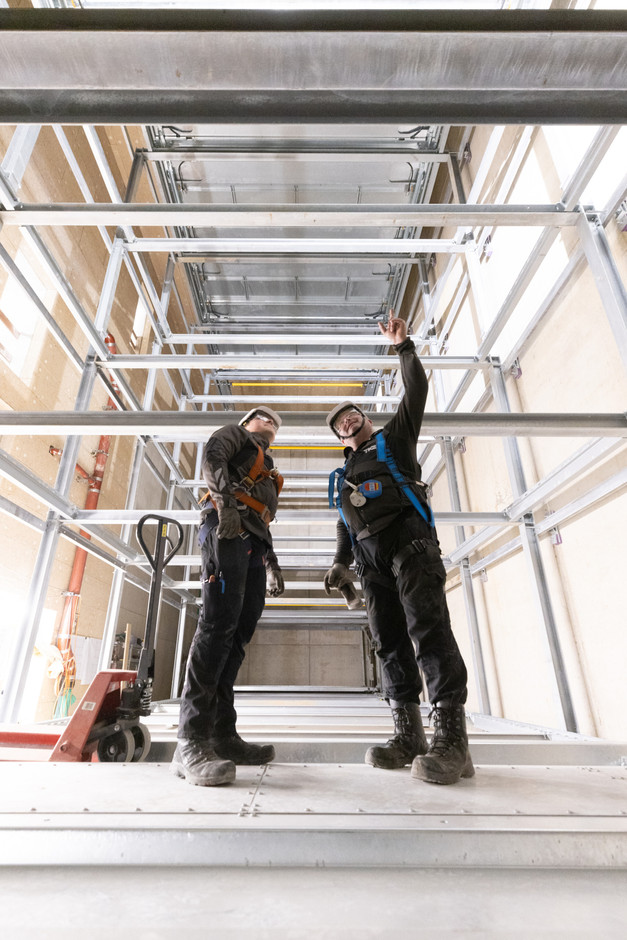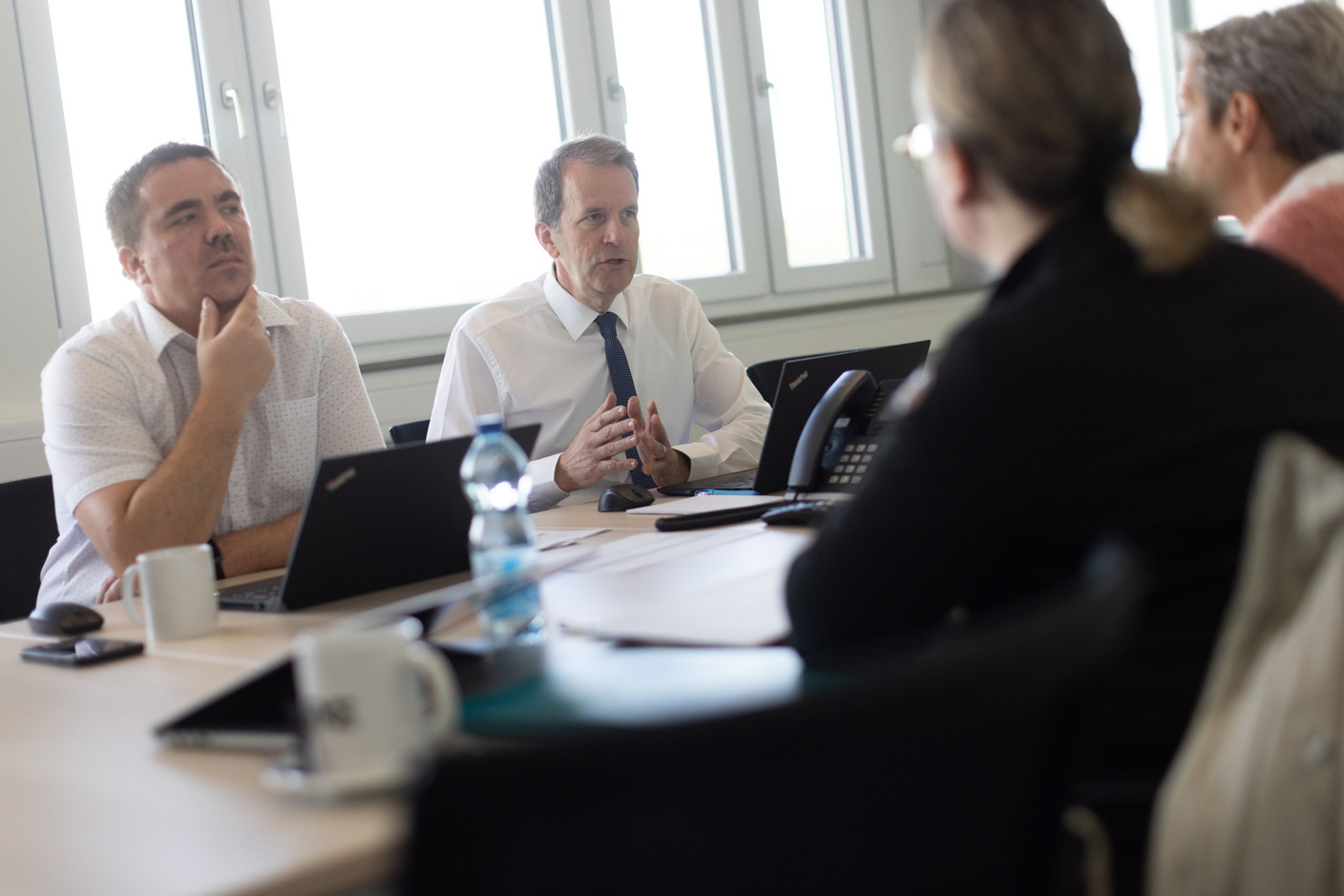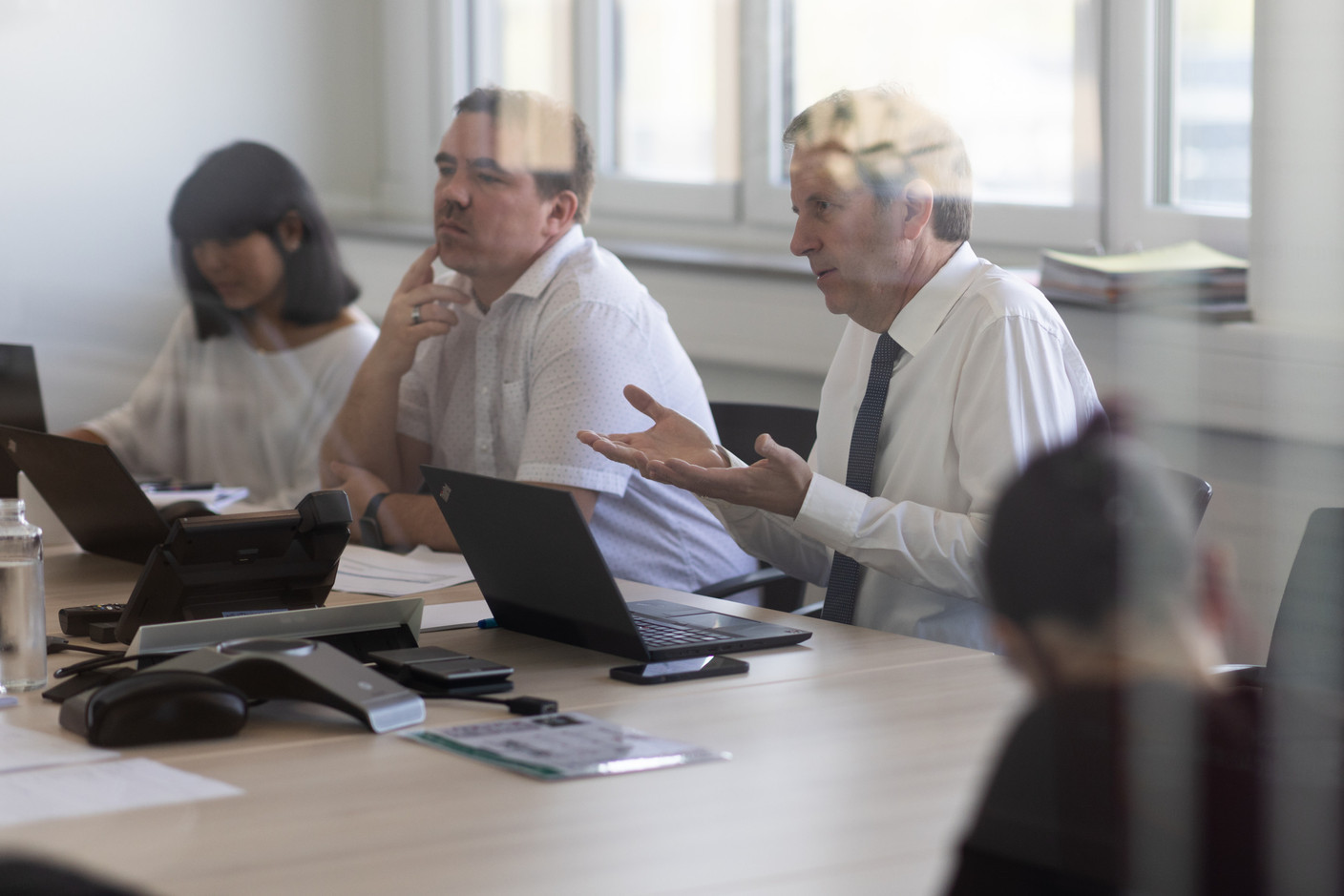“You’ll see--it’s spectacular!”
For my first day of immersion in ’s daily work, I have been invited not to his office but to a worksite at the Fondation Pescatore. TK Elevator Luxembourg (TKE)--of which Wampach is the director--specialises in lifts, escalators and other mobility systems for buildings. On this day we are visiting the installation of a 51-space automatic parking system. The director is proud of the project, whose scale is unprecedented for the company.
Equipped with helmets, safety shoes and a fall arrest harness, Wampach is making his fourth visit to the site in 2024. He isn’t here to talk technology but rather to see the workers. Managing the site is the job of the project manager, he explains. “The idea [of my visit] is to provide a presence as well as guidance and support.” That, says the graduate in business administration and management from ESCP Business School in France, is what being a company manager is all about.
We’re five storeys underground, where two of Wampach’s workers are busy finalising the installation of the mechanical car park. You can feel his closeness to these two in particular because he also plays the role of translator: “The German workers also need my presence, because not everyone on the site speaks German,” he explains. Wampach is the only Luxembourg native among TKE’s 52 employees.
Being present on TKE sites “allows me to understand what’s going on,” he says. “This ongoing communication with the people on the ground is extremely beneficial for the company, and enriches the discussions we have at meetings with the managers. It helps to make better decisions, because they’re inspired by what we’ve observed and the things that the workers have been able to tell me.”
On the current economic climate, the man who heads TKE is--like everyone else in the construction sector at the moment--worried. But he also remains optimistic: “Clearly, we’re worried when we hear that the number of building permits and sales in the future state of completion has fallen sharply and that companies are going bankrupt or laying off staff. But I think that despite the current difficulties in the sector, on the whole we can be reassured for the long term. We live in a country where there is a net influx of people every year, which necessarily generates property needs. I think we’ll get back on track in the long term. And, frankly, I also have confidence in our political decision-makers. Luxembourg has always been able to bounce back. When I was a child, we had the first oil crisis and the steel crisis, so every generation has its challenges. I continue to have confidence in my country.”
Faced with difficulties, Wampach is keen to remain “transparent and honest” because, in his view, “all business is based on trust, so we mustn’t try to make people believe something that doesn’t reflect reality.”
“Denial doesn’t go down well,” he adds. “I think people are keen to have their concerns acknowledged.” As such, his role as a company director “is to give an opinion on the difficulties in question, on how long we think it can last, to come up with ideas to remedy the situation.” Far from being defeatist, he believes that “our hands are not tied in these situations--there are always solutions.”
In the office
Wampach also spends a good part of his day at TKE’s offices in Contern. What’s on the agenda for a Monday morning? A meeting with the industrial occupational health service (Service de santé au travail de l’industrie or STI), a Fedil trade group unit that supports its members in matters of health and safety at work. Also present at the meeting are administrative officer Anne-Catherine Gori and project manager (and “designated employee”) Christian Brausch. The aim of the meeting is to review all the occupational health and safety aspects of the company’s activities.
Seated around a table with computers, piles of documents and cups of coffee, the parties--for the better part of two hours--discuss high-risk jobs; internal redeployment; company policy on addictions mental health, conflict management and chemical products; and other subjects too.
Wampach explains to the STI that he personally welcomes each new employee, and teaches each one the rules and culture of the company. “Given the importance of health and safety in our business, I want to look after it personally.” A certified designated worker in the field of health and safety at work, he also regularly runs in-house training courses on the subject.
When the STI asks about work-related accidents that have occurred at TKE, the company manager demonstrates his on-the-ground knowledge by getting up to mime how an accident--with no serious consequences--happened to an employee who was on the roof of a lift cabin.
Trying to balance work and life
Wampach explains that networking is an important part of his job, even though most of these activities come after working hours, i.e. in the evening or late afternoon. He has also been president of the Federation of Lift Operators (Fédération des ascensoristes) since 2011, which involves negotiating the collective agreement with the unions and discussing new draft regulations. Representing his federation at the Competence Centre for Building Services (Centre de compétences génie technique du bâtiment) in Bettembourg, the TKE director also gives courses in personnel management on Friday evenings.
What about his work/life balance? “I disconnect well in relation to my disconnection needs,” he says, adding: “during my weekends and holidays, I’ll still have a look at my emails.” Mind you, this workaholic immediately points out that he’s not asking others to do the same. “Quite the opposite!”
“[But] I’d be more worried,” he says, “if I came back [from time off] after several weeks without having followed anything, and wondering what would be waiting for me when I got back to the office. So [checking emails while away] reassures me. But that’s my personal way of doing things.”
This need for connection doesn’t stop him from delegating responsibilities, however. In his view, this is one of the reasons why there isn’t much turnover at TKE: “This autonomy gives them great satisfaction.”
Wampach is aware that the company has to be able to function normally in his absence, whether it’s during his three-week holiday to Australia or when he was hospitalised following a severe case of covid-19. The company director sees his role as one of “questioning, simplifying processes, coordinating and listening to the teams” as well as “raising awareness of the TKE brand and products.”
Hierarchy
Walking, cycling and above all music number among Wampach’s hobbies: the director sings in a choir and has performed in France, Lapland, Italy and Sweden. “This involvement allows me to disconnect,” he says, before adding: “it also allows me to meet very different people: there are doctors, teachers, retired people and people who work in crèches in the choir. It’s a reflection of society where there’s no hierarchy.”
Wampach is not proud (particularly) of his position in the company hierarchy, but rather of having developed the company, which he took over in 2005. “There were 16 of us at the time and we’ve tripled the number of employees. In terms of turnover, it’s even five times over. I’m proud of the fact that I’ve achieved all that.”
“Professionally, this company is my baby,” he concludes with a laugh.
This article in Paperjam. It has been translated and edited for Delano.
